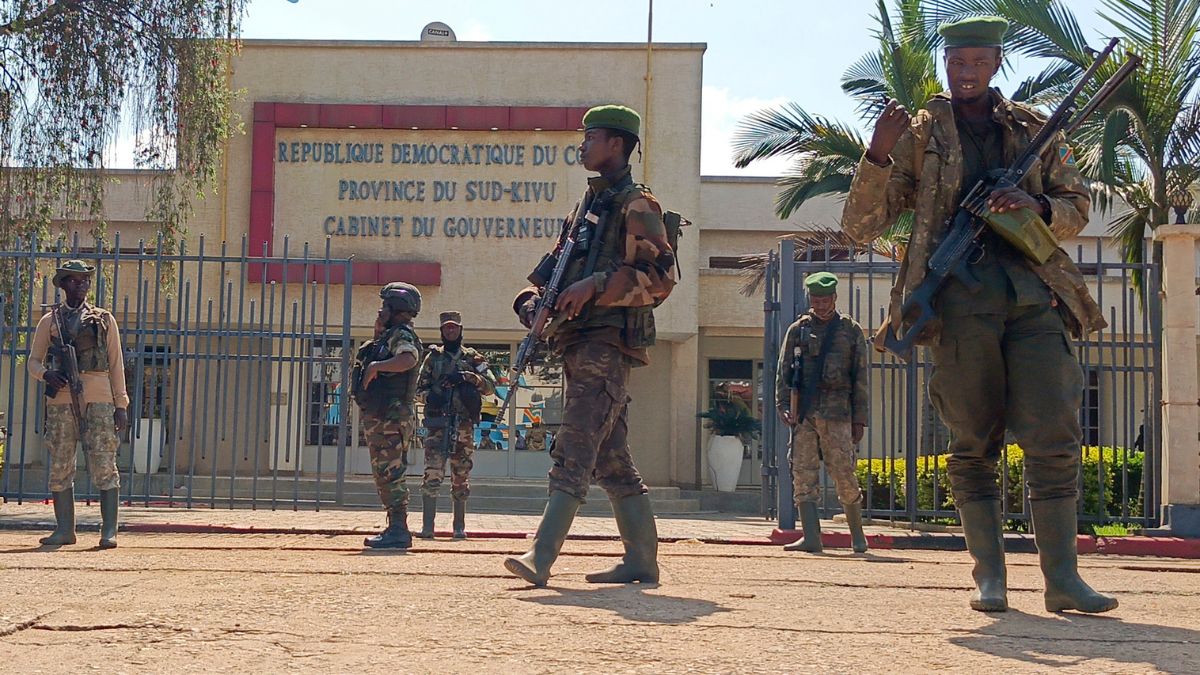Columns of M23 fighters, backed by Rwandan troops advanced into the center of another key city in eastern Democratic Republic of Congo on Sunday, as the African Union warned of growing concerns over the country’s potential fragmentation.
The armed group reached the outskirts of Bukavu, the capital of South Kivu province, on Friday, shortly after seizing control of its airport, located about 30 kilometers (18 miles) away.
With the fall of Bukavu, a city of one million that saw little resistance from Congolese forces (FARDC), M23 now holds full control over Lake Kivu, following its capture of Goma, the capital of North Kivu province, in late January.
On Saturday, many Congolese soldiers were seen retreating from the rebels’ advance into Bukavu, joining thousands of fleeing civilians amid widespread looting and panic.
Congo’s President Felix Tshisekedi convened a security meeting in the distant capital, Kinshasa. Officials stated on X that Bukavu was “briefly” invaded by M23 but remains under the control of the Congolese army and allied local militias. By Sunday, there were no visible signs of fighting or Congolese forces in most parts of Bukavu.
Tshisekedi has warned of the potential for the conflict to expand regionally. Congolese forces in Bukavu are receiving support from Burundian troops, while South African troops are aiding in Goma.
The rebels’ rapid advance since the start of the year and the involvement of troops from neighbouring countries have stoked fears of a broader regional war in a conflict rooted in tensions over power, identity and resources dating back to the 1990s Rwandan genocide.
Congo is the world’s top producer of tantalum and cobalt, a key component in batteries for electric vehicles and mobile phones. It is also the third global copper producer and home to significant coltan, lithium, tin, tungsten, and gold deposits.
Impact Shorts
More ShortsBukavu residents said on Sunday they had seen M23 troops passing through central districts since the early morning with no sign of opposition. At one point, intermittent gunshots could be heard from Camp Saio, Bukavu’s main military camp, two people living nearby told Reuters.
Videos verified by Reuters showed M23 fighters in fatigues parading and speaking to locals in Independence Square and outside the provincial governor’s office. Some locals welcomed the rebels with cheers and applause.
In another video, shared by the M23, one of its military commanders tells a group of cheering residents to leave the streets, saying operations were still ongoing.
”Go home. Let us finish the job and after three hours you can go for a walk,” said commander Bernard Byamungu.
SOLDIERS START LEAVING
On Saturday, a Congolese army officer told Reuters soldiers were evacuating from Bukavu in order to avoid ”carnage” like that seen in Goma. About 3,000 people were killed in the days preceding Goma’s capture, according to the United Nations.
The soldiers’ gradual departure in recent days led to a power vacuum, triggering looting and a prison break on Saturday.
M23’s arrival has been welcomed by some in Bukavu, who hope the rebels will restore order, said Congolese researcher Josaphat Musamba, who is from South Kivu.
The bloodshed in Goma and the presence of troops from Rwanda, Burundi, Uganda in eastern Congo have fanned fears of a wider war like two that devastated the region between 1996 and 2003, costing millions of lives.
The ongoing insurgency has also deepened an already dire humanitarian crisis in eastern provinces. The ”rapidly deteriorating” situation has left about 350,000 displaced people with no roof over their heads, the U.N. refugee agency warned on Friday.
The well-equipped M23 is the latest in a long line of ethnic Tutsi-led rebel movements to emerge in Congo’s volatile east. Congo’s government says it is a Rwandan proxy, which the rebel group and Rwanda deny.
With inputs from agencies
)